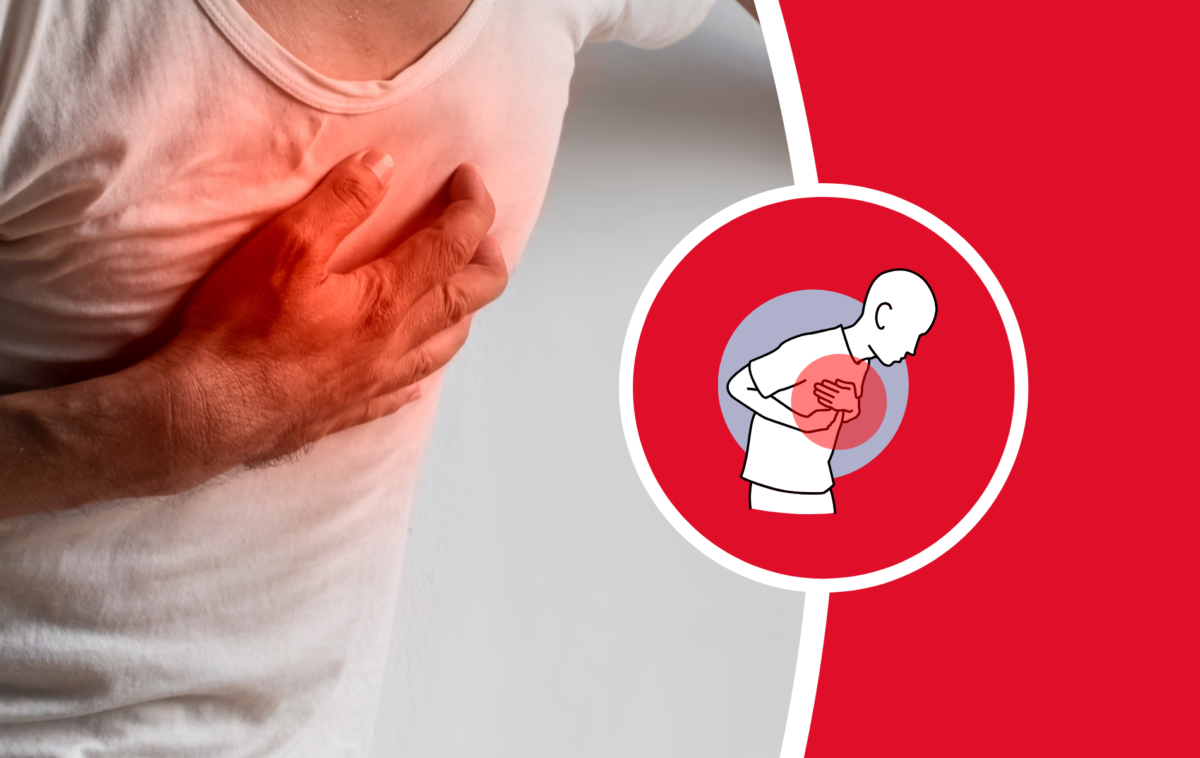Major Causes of Chest Pain and Lifestyle Tips for Prevention

Chest pain is a common symptom that can be caused by various health conditions. While chest pain is often associated with heart problems, it can also result from other causes such as lung, digestive, or muscle issues. Understanding the reasons behind chest pain and adopting preventive lifestyle changes can help reduce the risk of developing serious conditions.
Major Causes of Chest Pain
- Heart-Related Causes
- Angina: This is chest pain caused by reduced blood flow to the heart. It usually feels like pressure or squeezing in the chest. Angina can occur during physical activity or stress.
- Heart Attack: A heart attack happens when blood flow to the heart is blocked. This can cause intense chest pain that may spread to the arms, shoulders, neck, or back. It’s a medical emergency.
- Pericarditis: This is inflammation of the lining around the heart. It can cause sharp chest pain that may worsen when lying down or taking deep breaths.
- Aortic Dissection: A serious condition where the inner layer of the aorta (the main artery) tears, causing sudden and severe chest pain. Immediate medical help is needed.
- Lung-Related Causes
- Pulmonary Embolism: A blood clot in the lungs can cause chest pain, shortness of breath, and rapid heart rate. It’s a life-threatening condition.
- Pneumonia: Infection in the lungs can lead to chest pain, coughing, and fever. The pain may worsen with deep breaths or coughing.
- Pleurisy: This is inflammation of the tissues that line the lungs and chest cavity. It causes sharp pain, especially during breathing.
- Digestive System-Related Causes
- Acid Reflux: Also known as heartburn, acid reflux happens when stomach acid flows back into the esophagus. This can cause a burning sensation in the chest.
- Gallstones: Sometimes gallstones can cause pain that mimics chest pain, especially after eating fatty foods.
- Muscle and Bone-Related Causes
- Costochondritis: This is inflammation of the cartilage that connects the ribs to the breastbone. It can cause pain that is sharp and worsens with movement or pressure on the chest.
- Muscle Strain: Overuse or injury to the muscles around the chest can lead to pain. This type of pain usually increases with physical activity or certain movements.
Lifestyle Tips for Preventing Chest Pain
While some causes of chest pain, such as heart attacks or pulmonary embolisms, require immediate medical attention, certain lifestyle changes can help reduce the risk of developing conditions that lead to chest pain.
- Maintain a Healthy Diet
- Eat Heart-Healthy Foods: A diet rich in fruits, vegetables, whole grains, and lean proteins can help keep your heart healthy. Reduce your intake of fatty and processed foods, as these can raise cholesterol levels and increase the risk of heart disease.
- Limit Salt and Sugar Intake: High salt intake can raise blood pressure, increasing the risk of heart problems. Excess sugar can lead to weight gain and increase the risk of diabetes, both of which can cause chest pain.
- Exercise Regularly
- Stay Active: Regular exercise helps maintain a healthy weight, reduces stress, and strengthens the heart. Aim for at least 30 minutes of moderate exercise most days of the week. Walking, cycling, and swimming are great options.
- Don’t Overdo It: While exercise is important, overexertion can lead to chest pain due to muscle strain. Listen to your body and avoid pushing yourself too hard.
- Manage Stress
- Practice Relaxation Techniques: Stress can trigger chest pain, especially in people with angina. Deep breathing exercises, meditation, and yoga can help reduce stress levels.
- Get Enough Sleep: Lack of sleep can increase stress and strain on the heart. Aim for 7-8 hours of quality sleep every night to help prevent chest pain.
- Avoid Smoking and Limit Alcohol
- Quit Smoking: Smoking damages the heart and lungs, increasing the risk of conditions that cause chest pain. Quitting smoking is one of the best things you can do for your heart and overall health.
- Limit Alcohol: Drinking alcohol in moderation is key to maintaining heart health. Excessive drinking can raise blood pressure and increase the risk of heart disease.
- Monitor and Manage Medical Conditions
- Keep Blood Pressure and Cholesterol in Check: High blood pressure and high cholesterol are major risk factors for heart disease. Regular check-ups with your doctor and medications can help control these conditions.
- Manage Diabetes: People with diabetes are at a higher risk of developing heart disease. Controlling blood sugar levels through diet, exercise, and medication is crucial for preventing chest pain.
Chest pain can be caused by various factors, ranging from heart issues to digestive or muscle problems. While some cases require immediate medical attention, adopting healthy lifestyle habits can significantly reduce your risk of experiencing chest pain. By maintaining a balanced diet, staying active, managing stress, and avoiding harmful habits like smoking, you can keep your heart and body in good shape. If you experience persistent or severe chest pain, it’s important to seek medical help right away.

